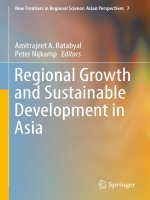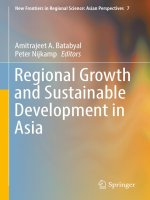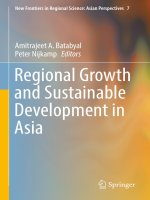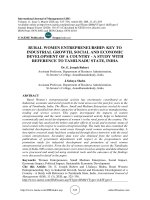Economic growth and economic development 170
Bạn đang xem bản rút gọn của tài liệu. Xem và tải ngay bản đầy đủ của tài liệu tại đây (60.98 KB, 1 trang )
Introduction to Modern Economic Growth
refer to as fundamental causes of economic growth. It is these reasons that are preventing many countries from investing enough in technology, physical capital and
human capital.
An investigation of fundamental causes of economic growth is important for at
least two reasons. First, any theory that focuses on the intervening variables (proximate causes) alone, without understanding what the underlying driving forces are,
would be incomplete. Thus growth theory will remain, in some essential sense, incomplete until it comes to grips with these fundamental causes. Second, if part of
our study of economic growth is motivated by improving the growth performance of
certain nations and the living standards of their citizens, understanding fundamental causes is central, since attempting to increase growth just focusing on proximate
causes would be tantamount to dealing with symptoms of diseases without understanding what the diseases themselves are. While such attacks on symptoms can
sometimes be useful, they are no substitute for a fuller understanding of the causes
of the disease, which may allow a more satisfactory treatment. In the same way,
we may hope that an understanding of the fundamental causes of economic growth
could one day all for more satisfactory solutions to the major questions of social
science concerning why some countries are poor and some are rich and how we can
ensure that more nations grow faster.
What could these fundamental causes be? Can we make progress in understanding them? And, perhaps most relevant for this book, is growth theory useful in such
an endeavor?
In this chapter, we will try to answer these questions. Let us start with the
last two questions. The argument in this book is that a good understanding of
the mechanics of economic growth, thus the detailed models of the growth process,
are essential for a successful investigation of the fundamental causes of economic
growth. This is for at least two reasons; first, we can only pose useful questions
about the fundamental causes of economic growth by understanding what the major
proximate causes are and how they impact economic outcomes. Second, only models
that provide a good approximation to reality and are successful in qualitatively and
quantitatively matching the major features of the growth process can inform us
about whether the potential fundamental causes that are proposed could indeed
156









